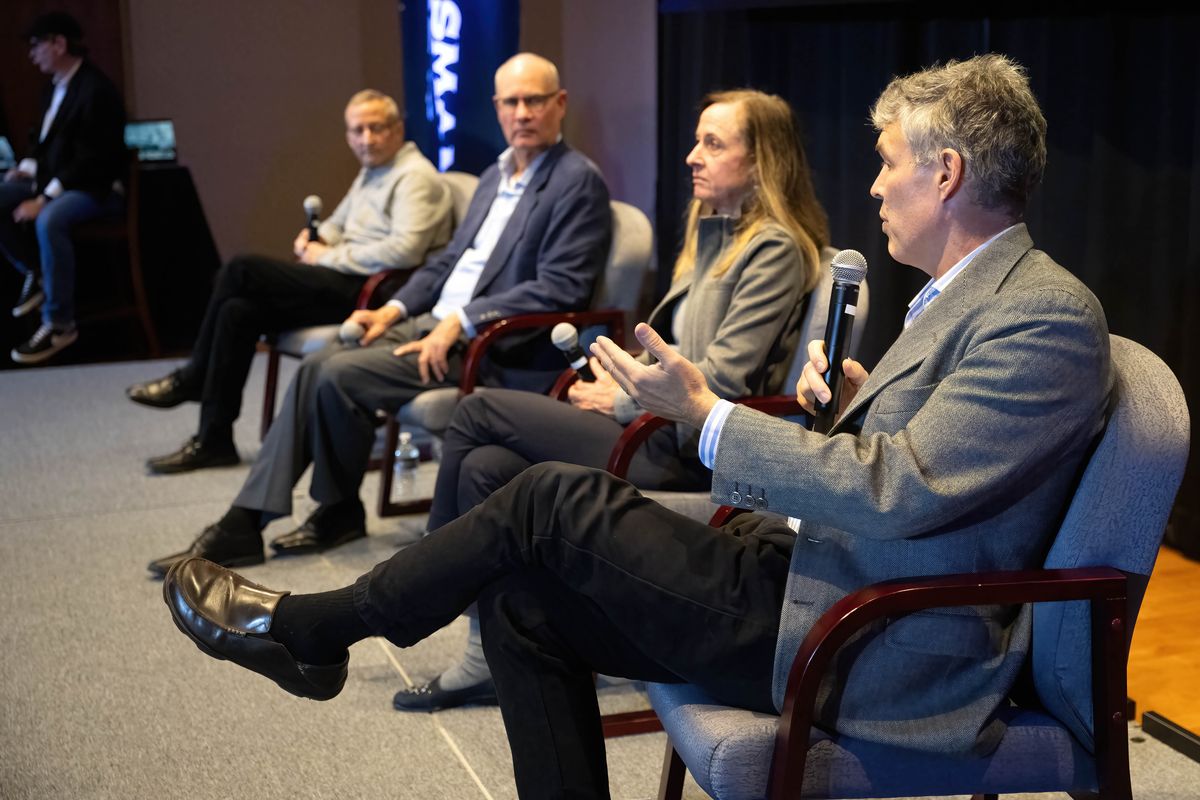‘There is no excuse for the number of people we have on dialysis’: Northwest Passages event imagines a world without kidney disease

Four panelists at Monday night’s Northwest Passages book series began to imagine a world without dialysis while discussing Tom Mueller’s “How to Make a Killing.”
The investigative journalist’s new book details the commercialization of the dialysis industry and its negative impacts on kidney disease patients. For many patients, dialysis is absolutely needed to survive. It’s the process of manually siphoning off toxic waste by an artificial kidney outside the body when the kidney inside the body fails.
But nephrologist Dr. Katherine Tuttle said that reality does not need to be true, and that the eradication of kidney disease should be the “aspirational goal.”
“We have the most powerful tools ever. And we now have a moral and ethical obligation to make sure that all patients who could benefit receive these therapies, and if we get it right, the need for dialysis will be dramatically reduced …” she said. “There is no excuse for the number of people that we have on dialysis in this country or in the world.”
Because of these tools, the industry can “start to talk about remission” even though it isn’t currently, Tuttle added.
“It’s not a fait accompli. We need to catch it early,” she said.
After years of researching the topic for his book, Mueller said dialysis should be an “obsolete” treatment.
An expert researcher and kidney disease health care practitioner, Tuttle said the reason preventive treatment of kidney disease is not more widespread is because of the for-profit nature of kidney disease treatment in the United States. It is much more profitable to treat someone “at the precipice of death” than preventing kidney disease through diet or medical intervention.
Over 80% of dialysis centers are owned by two large for-profit companies: DaVita and Fresenius. As of last year, the federal government expends nearly $38 billion annually for dialysis patients – much of which is funneled into these two companies at a tidy profit for their shareholders.
In his book, Mueller links that conglomeration to the United States having the lowest survival rate for dialysis patients of any industrialized nation, at 22% of dialysis patients dying each year.
“In a nutshell, monopolies are not good. We need to revisit just how much control certain companies have over the health care system, over the dialysis system,” Mueller said. Specifically, he called for the Federal Trade Commission to invoke antitrust laws to break up the dialysis industry.
“We have antitrust laws, last time I checked …” Mueller said. “And the FTC should be looking at this. Bigger is not better, and free markets are good, as long as they are free.”
To do that, advocacy will be needed – from the patients, from the providers and from the family members of those experiencing kidney disease. That’s because discussion of public policy changes has not yet occurred.
“There’s not something very sexy about urine,” Tuttle said of her experience lobbying Congress.
In the meantime, the panelists urged kidney disease patients to take care into their own hands.
“Be an informed consumer of medicine – being an educated, informed consumer and not a passive recipient,” advised WSU professor and dialysis patient Andrew Storfer.
Duane Sunwold, another kidney disease patient and a culinary professor, urged those with kidney disease or at risk of it to take control of their diet.
“I actually love my kidney disease, and I know that’s the weirdest thing I will ever tell people. It has taught me so much about the culinary field. I am totally now all about teaching people how to eat plant-based or more plant-dominant …” Sunwold said.
“The best advice I could give anybody who’s on a special diet is call ahead to the restaurant and tell the shop what your dietary constraints are. They’re really creative people. If they have some time, they would love to do something different and unique.”
Through dietary changes, Sunwold is in remission from his kidney disease. Tuttle, who is Sunwold’s doctor, noted other patients may not have the same experience.
“Most people will improve with lifestyle modification. Not everyone will have the benefit he has had,” she said.
Sunwold also urged the audience with fully functional kidneys to treasure their urine while they have it – he had even dreamed about peeing.
“Until you stop peeing, you don’t realize what a wonder it can be,” Mueller echoed.